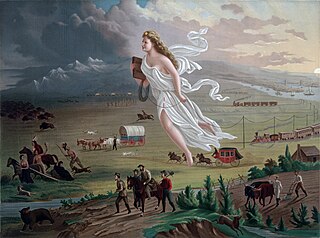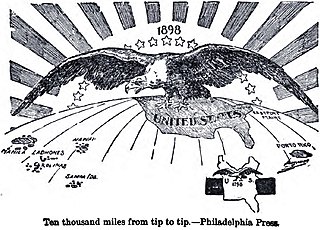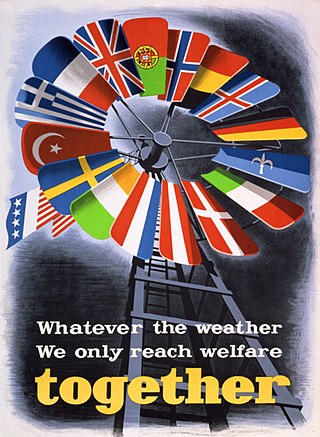
Continental Europe or mainland Europe is the contiguous continent of Europe, excluding its surrounding islands. It can also be referred to ambiguously as the European continent, – which can conversely mean the whole of Europe – and, by some, simply as the Continent. When Eurasia is regarded as a single continent, Europe is treated as a subcontinent, and called as European subcontinent.

The Marshall Plan was an American initiative enacted in 1948 to provide foreign aid to Western Europe. The United States transferred $13.3 billion in economic recovery programs to Western European economies after the end of World War II. Replacing an earlier proposal for a Morgenthau Plan, it operated for four years beginning on April 3, 1948. The goals of the United States were to rebuild war-torn regions, remove trade barriers, modernize industry, improve European prosperity and prevent the spread of communism. The Marshall Plan proposed the reduction of interstate barriers and the economic integration of the European Continent while also encouraging an increase in productivity as well as the adoption of modern business procedures.

The Americas are a landmass comprising the totality of North and South America. The Americas make up most of the land in Earth's Western Hemisphere and comprise the New World.

Nuclear warfare, also known as atomic warfare, is a theoretical military conflict or prepared political strategy that deploys nuclear weaponry. Nuclear weapons are weapons of mass destruction; in contrast to conventional warfare, nuclear warfare can produce destruction in a much shorter time and can have a long-lasting radiological result. A major nuclear exchange would likely have long-term effects, primarily from the fallout released, and could also lead to secondary effects, such as "nuclear winter", nuclear famine and societal collapse. A global thermonuclear war with Cold War-era stockpiles, or even with the current smaller stockpiles, may lead to various scenarios including the extinction of the human race.
A superpower is a state with a dominant position characterized by its extensive ability to exert influence or project power on a global scale. This is done through the combined means of economic, military, technological, political and cultural strength as well as diplomatic and soft power influence. Traditionally, superpowers are preeminent among the great powers. While a great power state is capable of exerting its influence globally, superpowers are states so influential that no significant action can be taken by the global community without first considering the positions of the superpowers on the issue.

Manifest destiny was a cultural belief in the 19th-century United States that American settlers were destined to expand across North America.
Corps is a term used for several different kinds of organization. A military innovation by Napoleon I, the formation was first named as such in 1805. The size of a corps varies greatly, but two to five divisions and anywhere from 40,000 to 80,000 are the numbers stated by the US Department of Defense.

American imperialism refers to the expansion of American political, economic, cultural, media and military influence beyond the boundaries of the United States. Depending on the commentator, it may include imperialism through outright military conquest; gunboat diplomacy; unequal treaties; subsidization of preferred factions; regime change; or economic penetration through private companies, potentially followed by diplomatic or forceful intervention when those interests are threatened.

The Cold War was a period of geopolitical tension between the United States and the Soviet Union and their respective allies, the Western Bloc and the Eastern Bloc. The term cold war is used because there was no large-scale fighting directly between the two superpowers, but they each supported opposing sides in major regional conflicts known as proxy wars. The conflict was based on the ideological and geopolitical struggle for global influence by these two superpowers, following their temporary alliance and victory against Nazi Germany and Imperial Japan in 1945. Aside from the nuclear arsenal development and conventional military deployment, the struggle for dominance was expressed via indirect means such as psychological warfare, propaganda campaigns, espionage, far-reaching embargoes, rivalry at sports events, and technological competitions such as the Space Race.

Cocacolonization refers to the globalization of American culture pushed through popular American products such as soft drink brand Coca-Cola. It is a portmanteau of the name of the multinational soft drink maker and "colonization".

The Cold War originated in the breakdown of relations between the two main victors in World War II: United States and the Soviet Union, and their respective allies, the Western Bloc and the Eastern Bloc, in the years 1945–1949.

Canada in the Cold War was one of the western powers playing a central role in the major alliances. It was an ally of the United States, but there were several foreign policy differences between the two countries over the course of the Cold War.

Atlanticism, also known as Transatlanticism, is the ideological belief in support for a close relationship between the peoples and governments of the allies to NATO in Northern America and those in Europe on political, economic, and defense issues to the purpose of maintainining the security and prosperity of the participating countries and protect liberal democracy and the progressive values of an open society that unite them under multiculturalism. The term derives from the Atlantic Ocean, which is bordered by North America and Europe.
Globalism refers to various patterns of meaning beyond the merely international. It is used by political scientists, such as Joseph Nye, to describe "attempts to understand all the interconnections of the modern world—and to highlight patterns that underlie them." While primarily associated with world-systems, it can be used to describe other global trends. The concept of globalism is also classically used to distinguish the ideologies of globalization from the processes of globalization. In this sense, globalism is to globalization what nationalism is to nationality.

Canada has not officially maintained and possessed weapons of mass destruction since 1984 and, as of 1998, has signed treaties repudiating possession of them. Canada ratified the Geneva Protocol in 1930 and the Nuclear Non-proliferation Treaty in 1970.

The Aleutian Islands campaign was a military campaign conducted by the United States, Canada, and Japan in the Aleutian Islands, part of the Territory of Alaska, in the American Theater and the Pacific Theater of World War II starting on June 3, 1942. In the only two invasions of the United States during the war of a U.S. incorporated territory, a small Japanese force occupied the islands of Attu and Kiska, where the remoteness of the islands and the challenges of weather and terrain delayed a larger American-Canadian force sent to eject them for nearly a year. Successful Japanese invasions of other U.S. territories, which were unincorporated territories, in the western Pacific shortly after the Attack on Pearl Harbor included Wake Island, Guam, and the Philippines. The islands' strategic value was their ability to control Pacific transportation routes as US General Billy Mitchell stated to the U.S. Congress in 1935, "I believe that in the future, whoever holds Alaska will hold the world. I think it is the most important strategic place in the world."

The escort fighter was a concept for a fighter aircraft designed to escort bombers to and from their targets. An escort fighter needed range long enough to reach the target, loiter over it for the duration of the raid to defend the bombers, and return.

The United States of America, commonly known as the United States or America, is a country primarily located in North America. It consists of 50 states, a federal district, five major unincorporated territories, nine Minor Outlying Islands, and 326 Indian reservations. The United States is also in free association with three Pacific Island sovereign states: the Federated States of Micronesia, the Marshall Islands, and the Republic of Palau. It is the world's third-largest country by both land and total area. It shares land borders with Canada to its north and with Mexico to its south and has maritime borders with the Bahamas, Cuba, Russia, and other nations. With a population of over 333 million, it is the most populous country in the Americas and the third most populous in the world. The national capital of the United States is Washington, D.C. and its most populous city and principal financial center is New York City.

Americanization or Americanisation is the influence of American culture and business on other countries outside the United States of America, including their media, cuisine, business practices, popular culture, technology or political techniques. Some observers have described Americanization as synonymous with progress and innovation. However, it is also used as a pejorative term by critics who oppose American influences.

A continent is any of several large geographical regions. Continents are generally identified by convention rather than any strict criteria. A continent could be a single landmass or a part of a very large landmass, as in the case of Asia or Europe. Due to this, the number of continents varies; up to seven or as few as four geographical regions are commonly regarded as continents. Most English-speaking countries recognize seven regions as continents. In order from largest to smallest in area, these seven regions are Asia, Africa, North America, South America, Antarctica, Europe, and Australia. Different variations with fewer continents merge some of these regions, examples of this are merging North America and South America into America, Asia and Europe into Eurasia, and Africa, Asia, and Europe into Afro-Eurasia.
















